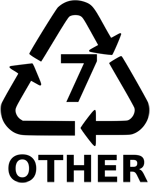A hotel encourages guests to help save the planet by reusing towels. This so-called “green campaign” may just be a cost-cutting measure in disguise if the hotel is doing little to conserve energy or water in other parts of their operations. Chasing arrows on plastic packaging imply it is recyclable. In fact, plastics marked with six of the eight codes surrounded by these symbols currently have little or no recycling potential. These are both examples of what could be considered “greenwashing.”
 |
Chasing arrows on a plastics container do NOT mean it is recyclable. The only information in the symbol that means anything is the number inside the arrows, which indicates the general class of resin used to make the container. |
Greenwashing is misleading the public about environmental practices or the environmental benefits of products, services or programs. It combines the words “green” (which, by the way, is also the color of money) with “whitewash.” Whitewash is not really paint – it is an inexpensive thin plaster made from slaked lime. Whitewashing has become associated with glorifying or covering up something unpleasant like a vice or crime.
There is nothing wrong with protecting the environment in a way that also saves money – that is called a win:win situation. After all, business is about profit. The problem arises when cost-cutting measures like towel reuse are painted with a green brush in an attempt to deceive. It is also a problem when a company spends more time or money trying to convince people that they are green instead of actually investing in environmentally responsible operations or products. In some cases, polluters or companies that are simply complying with the law use green advertising to divert attention, or to exaggerate their efforts in order to make them look proactive or voluntary. And in a few cases, the claims are bald-faced lies.
Well-intentioned, environmentally conscious consumers want their purchases to reflect their values. Typically, when people see the words “earth-friendly” “eco-safe” or “all-natural,” they assume the claims are more than hype. After all, we do have laws about truth in advertising. Unfortunately, in some cases there is nothing behind these buzzwords.
In 2007, TerraChoice, an environmental marking firm, did a survey of 1,018 common consumer products bearing 1,753 environmental claims. All of these items were for sale in chain stores. They concluded that 99% were guilty of greenwashing via misleading visuals or words, vagueness, exaggeration, or sins of omission. Of the 1,018 products:
- 998 had a hidden tradeoff – e.g., products marketed as ‘energy-efficient’ that contained hazardous materials.
- 454 had no proof or verifiable certification backing up their claims.
- 196 made claims so vague that they were likely to be misunderstood.
- 78 promoted irrelevant information, like noting that they were CFC-free, when CFCs have been banned in the U.S. for 20 years.
- 10 falsely claimed to be certified to an environmental standard like Energy Star or GreenSeal.
- 17 diverted attention away from other “evils.” My personal favorite in this category is “organic cigarettes” made with natural tobacco. These products are not healthier or less addictive. (Keep in mind that arsenic, uranium and mercury are “all natural” too.)
- 10 made false environmental claims (e.g., a dishwasher detergent that was purportedly packaged in “100% recycled paper” even though the container was made of plastic.)
Next week’s article will help smart shoppers sort through the hype, so they can give their market share to companies that really are working to reduce their impact on the environment. |

